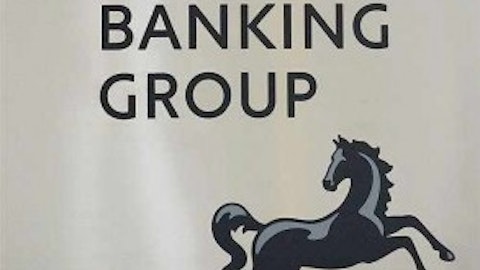LONDON — Every investor dreams of that elusive 10-bagger, the stock that multiplies every pound or dollar you invest by 10. This doesn’t just happen with smaller companies: At least 10 FTSE 100 stocks have delivered a total return of between 1,000% and 2,000% over the [ast decade, according to research from Fidelity Worldwide Investment. Last week, I looked at the top 3 FTSE shares over the past 10 years. But the next three are almost as impressive. And they are …
Randgold Resources
There are more peaceful places to do business than Mali, but few more profitable.
Over the past decade, Randgold Resources Ltd. (ADR) (LSE:RRS) (NASDAQ:GOLD), a gold miner and explorer mostly based in the strife-torn African nation, has returned a dazzling 1,723%. Its strategy is to unearth multimillion-ounce deposits in the prospective gold belts of West and Central Africa and develop them into profitable mines. It currently operates four gold mines — Morila, Loulo, and Gounkoto in Mali and Tongon in Cote d’Ivoire — and is developing a fifth, Kibali in the Democratic Republic of the Congo.
After enjoying a golden decade, its share price is down 23% over the past six months, and that’s despite reporting record production levels in 2012 and a 16% rise in full-year profits to $511 million. Even a 25% dividend hike didn’t help the share price shine, although on a current yield of 0.6%, this isn’t for income seekers.
The falling gold price is a concern, as investors become less risk-averse. Political unrest is another worry, both in Mali and Cote d’Ivoire. But Randgold Resources Ltd. (ADR) (LSE:RRS) (NASDAQ:GOLD) is hungry for more and has launched a hefty program of capital investment. The recent share-price dip looks like a buying opportunity, except I worry that gold’s glory days are now over. Despite its impressive portfolio of mines, this stock is too risky for me. Gold bugs will feel differently.
Tullow Oil
If gold isn’t your thing, what about black gold?
Today’s second FTSE 100 multibagger is oil explorer Tullow Oil plc (LON:TLW), which returned 1,600% over the past decade, making it a sweet 16-bagger. It enjoyed a solid 2012, with sales revenue up 2% to $2.34 billion, and full-year profit before tax up 4% to $1.1 billion. Net debt fell from $2.9 billion to $1 billion. Highlights included the discovery of a new oil basin in Kenya, the Ngamia-1 and Twiga South-1 wells, its fourth major discovery in six years. It also enjoyed success in Uganda and Ghana.
Exploration will always be a risky business, and Tullow Oil plc (LON:TLW) wrote off an eye-watering $671 million on failed exploration activities, a massive leap from the $121 million lost in 2012. Happily, its strong balance sheet should help it shrug off these losses, as well as fund the 40 exploration and appraisal campaigns in 2013, including new territories in Africa as well as Guinea, Greenland, Uruguay, and Mozambique.
You only have to look at the company’s earnings-per-share growth to see how volatile your holding is likely to be. It rose an almighty 795% in 2011, before crashing to -5% last year. The current forecast is for a sober 12% in 2013. Tullow Oil plc (LON:TLW) hasn’t enriched recent investors; its share price is down 4% over the past three years. That could make now a good entry point, if you can stand its pricey valuation of at around 27 times earnings.
For those willing to take a bigger risk with part of your portfolio — and from time to time you should — Tullow Oil plc (LON:TLW) is still tempting.
Weir Group
I’ve never quite got around to buying Scottish engineering company The Weir Group PLC (LON:WEIR) , and just look what I’ve missed: a massive 1,555% return over the past decade.
Pumps, turbines, and valves make the industrial world go round, and The Weir Group PLC (LON:WEIR) has earned investors a pretty penny by supplying them. This is a nicely diversified global business, with customers in 170 countries across the U.S. and Europe, Latin America, and Asia-Pacific. The flip side is that Weir is a play on global growth and can be volatile.
There was a great buying opportunity last summer, when it briefly became the most heavily shorted stock in the FTSE 100, following a slide in demand for equipment from the U.S. shale gas industry. The stock has since rebounded 66%. And that’s the problem I have with Weir. After such a great run, where can the share price go next?
Recent full-year results were good, with revenue rising 11% to 2.53 billion pounds in 2012, and profit before tax rising 12% to a record 443 million pounds. Its total dividend was up 15%, and although Weir yields just 1.5%, another double-digit increase is planned for 2013. These were results to gladden the market, but EPS growth looks modest at 2% in 2013 and 10% in 2014.
Weir isn’t that expensive, trading at 15.9 times earnings, but I wish it was a little cheaper.
The article 3 More FTSE 100 Shares That Surged 1,000% in 10 Years originally appeared on Fool.com and is written by Harvey Jones.
Harvey Jones has no position in any stocks mentioned. The Motley Fool recommends Weir Group.
Copyright © 1995 – 2013 The Motley Fool, LLC. All rights reserved. The Motley Fool has a disclosure policy.






